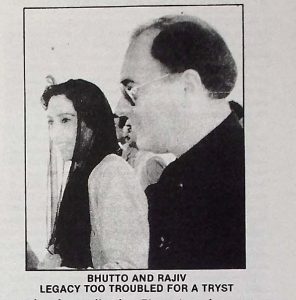
ISLAMABAD, JAN. 1, REUTER — Pakistan and India have made a flying start to a new era of warmer relations, ushered in with words of high optimism by their two young leaders and the first agreement between the countries in 16 years.
After four decades of war hare and deep mistrust, hostility was remarkably by its absence when Prime Minister Rajiv Gandhi, 44, arrived on the first visit to Pakistan by an Indian leader in 28 years to attend a South Asian summit.
After hours of private talks with new Pakistani Prime Minister Benazir Bhutto, 35, the two countries signed a pact promising not to’ attack each other’s nuclear installations.
“An extremely important. and significant step has been taken today to improve relations between India and Pakistan,” Bhutto told a joint news conference with Gandhi on Saturday.
“I felt that there is definitely a mood on both sides to try and get things back on track and normalize the situation between our two countries,” Gandhi said on arrival back in New Delhi.
The optimism, however, was tinger with caution and by political realities.
Memories of the bloodshed that accompanied the Partition of British India when Pakistan and India became independent in 1947 are still strong on both sides of the border.
So are the memories of the three wars the two countries have fought, Pakistan humiliated in each, leaving territorial disputes in their wake.
And there are present day political constraints, especially on Bhutto, which lend an air of caution to the burgeoning detente.
“Through the process of confidence-building measures we will step by step move towards the more intractable issues between us by removing the less intractable ones first,’ said Bhutto in a clear message for people not to expect too much too soon.
Leading Indian Foreign Policy Analyst Pran Chopra said it would be up to New Delhi, where hopes of better relations soared to almost euphoric levels after Bhutto was appointed Prime Minister following November elections, to show restraint.
“Nothing should be done by India which gives anyone in Pakistan the feeling that she has been invited into the Indian Parlour and is feeling comfortable there,” he said.
“I think that is the way it is being played,” Chopra said.
Bhutto and her Pakistan People’s Party (PPP) won the most parliamentary seats in the elections, but not an overall majority.
Her accession to power brought democracy back to Pakistan after 11 years of Tule by President Mohammed ZiaulHaq, who died ™m a mysterious air crash in August.
The restoration of democracy was the cause of Indian optimism. Indian officials never made any secret of their profound distrust of Zia, whose army they accused of fueling a Sikh Separatist revolt in India’s Punjab.
Gandhi alluded to that mistrust on his arrival back in Delhi. “I can also Say with confidence that we believe PPP policies will be much better than the earlier policies on the more difficult areas,” he said.
But Pakistan officials said that with no absolute majority in Parliament, an army only just out of power looking over her shoulder, and her position as a woman leader in a Moslem State meaning she had to be careful not to offend male Islamic sensibilities, Bhutto could not move without caution.
“It has to be a step by step process, outie and cautious,” said one.
Apart from the Punjab Separatist campaign, which cost more than 2,500 lives in 1988, India is also at deep odds with Pakistan over divided Kashmir, the cause of two of the three wars and which both sides claim.
There is also sporadic fighting over the Siachen Glacier, at 6,000 meters (20,000 feet) high in the Himalayas the world’s high.
Article extracted from this publication >> January 6, 1989